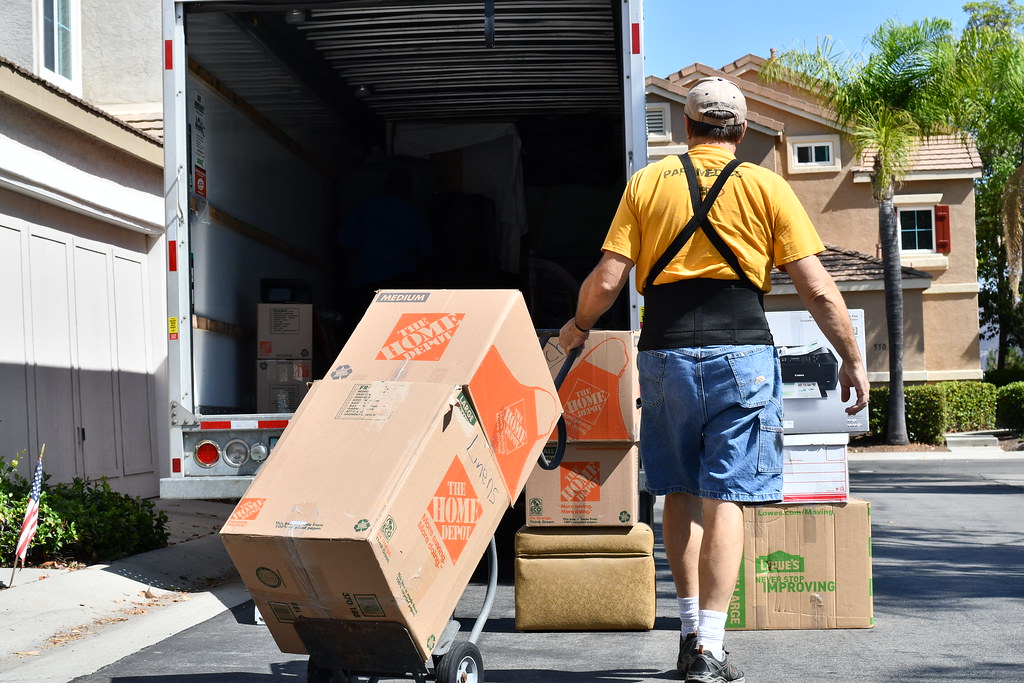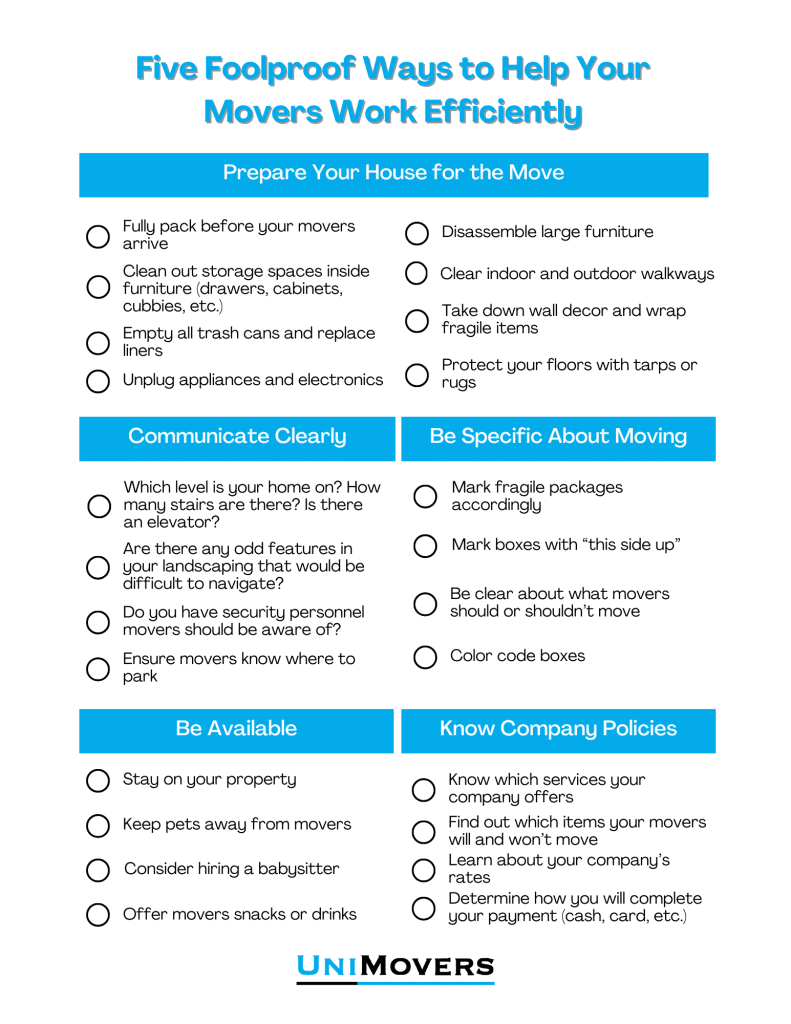It’s moving day. You’ve spent months figuring out logistics and packing, you’ve hired movers, and you want everything to go smoothly. Luckily, there are things you can do to prepare. We’ll go over a checklist of five ways you can prepare to help your movers work efficiently on moving day.
Table of Contents
1. Prepare Your House for the Move
First on the checklist are ways you can prepare your house for easy moving. Some moving companies like UniMovers will help you pack and unpack boxes. However, if your moving service isn’t going to help with packing, make sure you’re fully packed, with items in well-secured boxes (no garbage bags!).
Clean out storage spaces inside furniture, such as desk drawers. This will make the furniture easier to transport. In addition, unplug appliances such as refrigerators and lamps, and disassemble large furniture items like beds.
Make sure walkways within your home are clear. If you have any shelving units or wall art that might be damaged, take them down in advance. Wrap up fragile items like mirrors. Also, set aside any belongings that you don’t want movers to take care of.
Lastly, take steps to protect your floors, especially if it’s slush season. Cover walkways with blankets and tarps. In snowy or icy conditions, make sure you’ve shoveled and salted your doorstep to keep your movers safe.
2. Communicate Clearly Before the Move
Another key part of a successful moving day is clear communication. Don’t give your movers any surprises, like having a very heavy furniture item you didn’t tell them about.
Many features of your home can affect how long it takes to move. For example, how many steps lead up to your home and whether or not there’s an elevator. Let movers know in advance what your moving situation is like. You can also mention any odd features of the landscape that might make moving harder.
Set movers up for success by ensuring they’ll have easy access to your home. For example, if you live in a gated community or an apartment complex with security, let the movers know how to get in, and tell the relevant people to expect them.
Movers will also appreciate instructions for where to park. To avoid issues, check whether you need a moving permit; these may be required in big cities. In addition, consider letting your neighbors know there’ll be a large truck parked outside.
3. Be Specific About Moving
Prepare your items with specific instructions. For example, if you have fragile items, mark the boxes as fragile. You can write “this side up” on boxes that shouldn’t be turned. In addition, if you have any particularly important items, let your movers know! It never hurts to do a final walk-through of your home with the movers once they arrive to make sure you’re on the same page.
Give the movers clear instructions about what they should and shouldn’t move. Be aware that there are some items that movers will not move. These items may include valuables, liquor, plants, cleaning supplies, and pets.
Tell your movers what to do with your items during the unloading process. Consider giving your movers a floor plan of your new home and color-coding your boxes by room so they know where to put your boxes.

4. Be Available
On moving day, stay on your property in case the movers have questions.
At the same time, stay out of their way. They are experts with plenty of moving experience. Keep any kids and pets away from the movers to avoid disrupting their work. Consider hiring a babysitter if you’re not sure you’ll be able to watch your kids while answering the movers’ questions.
While you’re home, you can also offer the movers refreshments. Hot drinks in the winter and cold drinks in the summer will make the movers more comfortable. If it’s a long move, have some snacks on hand, and consider offering some more substantial food like sandwiches or pizza.
5. Know Your Company’s Policies
Prepare for the move by doing some research on your company’s policies. Know what services they will and won’t provide. For example, UniMovers is a labor-only company, meaning we’ll help with the labor of moving but don’t provide a truck. A labor-only service is cheaper, but only you know what kind of moving service is right for you.
Additionally, companies may have varying policies on which items they will and won’t move. Find out what your moving company’s policy is and make plans to move items yourself if needed.
Know how your company determines moving costs. For example, a company like UniMovers charges fixed hourly rates. UniMovers accepts card payments and will not add hidden fees for factors like stairs and pianos. However, companies may vary. Calculate how much you’ll owe in advance and have your payment on hand in the appropriate form.
Lastly, see if your company has a tipping policy. Consider whether or not you will tip your movers; they will always appreciate a tip as a thank you!
Conclusion

Now you have a checklist of ways you can prepare for your moving day. You can take steps to prepare your home, including getting your furniture and appliances ready.
Communicate clearly before moving day, make sure your movers understand your moving situation, and have easy access to your home. Give specific directions about what items movers should move and where these items should go.
Be available for movers on moving day, and help minimize disruptions to their work. Finally, check out your company’s policies, including payment policies.
Whether you’re deep in the packing process or are ready to hire movers, keeping this checklist in mind will set you up for a smooth and efficient moving day!

Sophie Pollack-Milgate has a day job as a bioethics research assistant. In her free time, she likes to read books critiquing psychiatry, complain about how either ice or heat are ruining her runs (depending on the season), and modify recipes beyond recognition.




